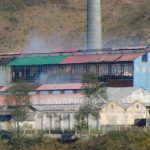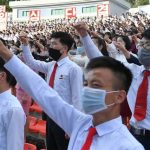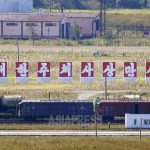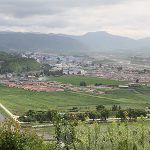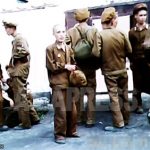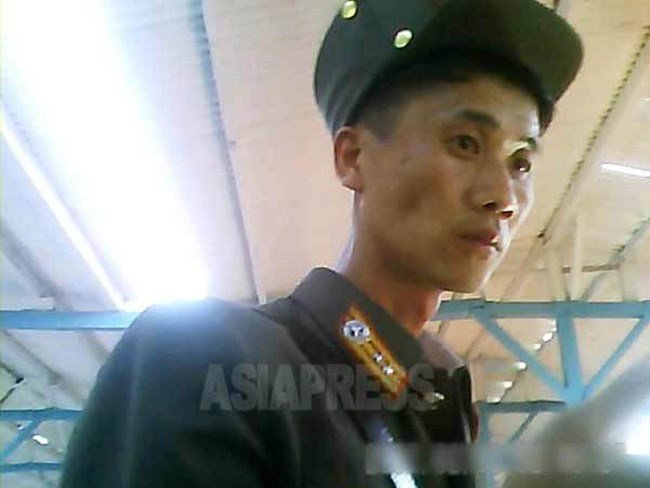
In North Korea, the threshing and drying of rice after the autumn harvest has been completed, and the handover of “army rice” has begun at cooperative farms all over the country. Still, the delivery of the rice from the cooperative farms has become difficult due to coronavirus and fuel shortages. Since September, even the families of officers have been cut off from receiving rations. Our reporting partner, who lives in the northern region of North Korea, researched the issue in mid-November and reported back to us (Kang Ji-won).
◆ Difficulties Distributing Military Rice from Farms
The Kim Jong-un regime has strictly controlled contact between soldiers and the general population since the COVID-19 pandemic last year. If a COVID-19 outbreak occurs in the military, where dense living conditions are unavoidable due to group living, it could spread quickly within units. For this reason, soldiers and officers are strictly forbidden from leaving their units.
Troops must prepare vehicles and visit farms to collect “military rice” (this includes grains other than rice) produced at cooperative farms. Still, due to restrictions on contact with the farmworkers, "military labourers" are dispatched to take care of miscellaneous tasks for the troops. However, the number of workers is wholly inadequate, causing serious delays.
Even when the military has no choice but to send soldiers, the work does not proceed smoothly. In addition to the shortage of personnel, another problem is the shortage of fuel. It is said that the military cannot even send trucks with their troops to the farms.
The “12th Corps” military unit is stationed in the northern part of the country, in Ryanggang Province. An ASIAPRESS partner who lives in the region surveyed the rations of the unit. Since it is challenging to contact military personnel, the partner met with military officers' families and interviewed them. The following is their report.
◆ Even rations for officers' families have been delayed
“The rations for officers belonging to the 12 Corps had been available until August this year, but those for their families were not available. In September, the situation became even more difficult, and the officers' families seemed to be having a tough time. Although there were some domestic soy sauce and soybean oil rations, the most important food rations were delayed. In many cases, the officers' wives took their children back to their parents' homes, leaving the officers alone."
The wives and family members of officers are prohibited from doing business by military law. In addition, since last year, family members' access to markets has been severely restricted due to the coronavirus quarantine. This is to prevent them from interacting with civilians. As a result, life is challenging for the officers' families as they cannot do side jobs.
“The wife of one of the unit's chiefs of staff told me that she tried to go back to her parents' home in South Hamkyung Province because she couldn't afford to live there, but they didn't give her a travel certificate, so she has been waiting for a long time. I heard that at the top, officials are saying, 'Absolutely maintain rations for officers and their families,' but this is far from the actual situation."
◆ Encouraging the military to achieve self-sufficiency
Many of North Korea's military units cultivate farmland known as "sideline land." This is to secure supplementary sources of food. This includes beans, corn, radishes for kimchi, and Chinese cabbage. However, since it became difficult to secure food provisions for the army this fall, the army was instructed to be "as self-sufficient as possible," and all the harvests from the "sideline land," except for vegetables, were to be reported to the top and deducted from the army rice quotas. This is because there is no prospect of improvement next year.
After the harvest began in mid-September, several farms around the country were hit by raids on fields and warehouses by groups of soldiers. Now that even the officers' families have become impoverished, the problem of “feeding the troops" has become an urgent issue for the Kim Jong-un regime.
※ ASIAPRESS contacts its reporting partners in North Korea through smuggled Chinese mobile phones.
- <Inside N. Korea> The Great Annoyance of Kim Jong-un's Visit to Samjiyon: Residents Forbidden to Step Out for Several Days (2021-11-25)
- Top Secret Documents on North Korea's 'Tongpyo’: Regime Admits to Suspending the Issuance of Banknotes Due to Financial Woes (2021-11-13)
- <Inside N. Korea> Nationwide Medicine Shortage Results in Rising Deaths Among Infants and Elderly (2021-11-08)
- <Interview with a Single Mother> More and More Young Women Avoiding Marriage - ISHIMARU Jiro (2021-11-02)
- <Inside N. Korea> Authorities Crackdown on Rising Prostitution Among Underage Girls, Including 'Aid Relationships' (2021-11-02)

